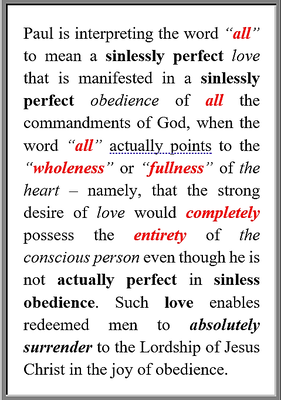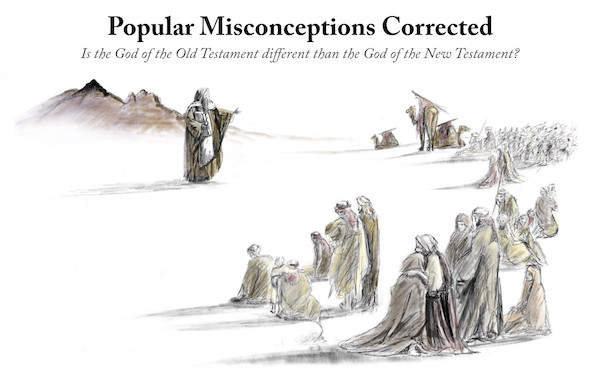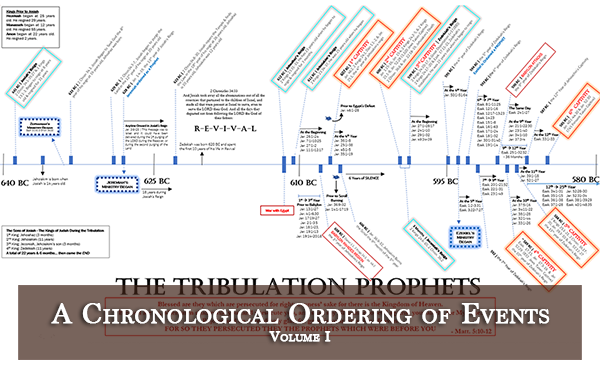LOVING GOD WITH ALL YOUR HEART - Paul Washer

“What is the greatest sin? Well, what’s the greatest command? Love the Lord your God with all your heart, soul, mind, and strength. Do you realize you’ve never done that, not one second, in any day of your life? You and I have never loved the Lord our God with all our heart, soul, mind, and strength.” – Paul Washer
“The greatest command is to love the Lord your God with all your heart, soul, mind and strength. You’ve never done that, and neither have I. But Christ always did that, think about that.” – Paul Washer
“What is the greatest sin? Well, what’s the greatest command? Love the Lord your God with all your heart, soul, mind, and strength. Do you realize you’ve never done that, not one second, in any day of your life? You and I have never loved the Lord our God with all our heart, soul, mind, and strength.” – Paul Washer
“The greatest command is to love the Lord your God with all your heart, soul, mind and strength. You’ve never done that, and neither have I. But Christ always did that, think about that.” – Paul Washer
Anyone who says you cannot love God with all your heart, mind, soul, and strength needs to be openly rebuked (1 Tim. 5:20). Moses (Deut. 6:5), Joshua (Josh. 22:5), Samuel (1 Sam. 12:20, 24), David (1 Kings 2:4), Solomon (1 Kings 8:23, 48), Joel (Joel 2:12), Jeremiah (Jer. 29:13), and Jesus (Lk. 10:25-28) explicitly disagree with Paul Washer.
|
MOSES
“And thou shalt love the LORD thy God with all thine heart, and with all thy soul, and with all thy might.” – Deut. 6:5 |
JOSHUA
“…love the LORD your God, …and to serve him with all your heart and with all your soul.” - Josh. 22:5 |
SAMUEL
“…Only fear the LORD, and serve him in truth with all your heart:…” - 1 Sam. 12:20, 24 |
|
DAVID
“…walk before Me in truth with all their heart and with all their soul…” - 1 Kings 2:4 |
SOLOMON
“…walk before Thee with all their heart…” - 1 Kings 8:23-24; “…And so return unto thee with all their heart, and with all their soul,” - 1 Kings 8:46-53 |
JOEL
“Therefore also now, saith the LORD, turn ye even to me with all your heart, and with fasting, and with weeping, and with mourning…” - Joel 2:12-14 |
|
JEREMIAH
“And ye shall seek me, and find me, when ye shall search for me with all your heart.” – Jer. 29:10-14 [Deut. 4:29-31] |
JESUS
“…Thou shalt love the Lord thy God with all thy heart, and with all thy soul, and with all thy strength, and with all thy mind; …this do, and thou shalt live.” - Lk. 10:25-28 |
A correct reading of the Law reveals this to be the essence of true religion from the beginning. This is a focal point of divine provocation or divine satisfaction all throughout biblical Church History. This heart is essential to Jewish Identity throughout all ages (Rom. 2:28-29, 9:6-8, Lk. 1:6), inasmuch as circumcision was essential to the Abrahamic Covenant (Gen. 17:1-14). Literally, one cannot be a true Jew without this inward experience of religion in the soul. Therefore, illustriously, Moses described this to be a circumcision of heart in Deuteronomy 30:6.
|
“And the LORD thy God will circumcise thine heart, and the heart of thy seed, to love the LORD thy God with all thine heart, and with all thy soul, that thou mayest live.” – Deut. 30:6
|
Of course, this promise is fulfilled in Jesus Christ (2 Cor. 1:20). This heart condition is now the essence of true Christianity. For, the Gentiles become the Children of Abraham through conversion to Christ (Gal. 3:7; Lk. 3:8, Jn. 8:39). Accordingly, through a genuine spiritual circumcision the Gentiles become characteristically Jewish in God’s sight because God seeth not as man sees (1 Sam. 16:7).
|
“And ye are complete in him, which is the head of all principality and power: In whom also ye are circumcised with the circumcision made without hands, in putting off the body of the sins of the flesh by the circumcision of Christ: Buried with him in baptism, wherein also ye are risen with him through the faith of the operation of God, who hath raised him from the dead.” - Colossians 2:10-12
“For we are the circumcision, which worship God in the spirit, and rejoice in Christ Jesus, and have no confidence in the flesh.” - Philippians 3:3 [Eph. 2:19] |
This being the case, it’s no wonder that this commandment is the “first” and greatest commandment of all the Law & the Prophets (Matt. 22:35-40). This is the single most important moral commandment of the Old Testament because all the doctrine of every Covenant in the Old Testament exists to guide and empower redeemed men to love God with all the heart, mind, soul, and strength. Therefore, we can be sure that it is a very great sin to wrest the meaning of this ultimate divine commandment (2 Pet. 3:16). A very small sin against the greatest commandment amounts to a very great sin in the sight of God! Twisting the meaning of the greatest commandment violates and corrupts the purpose of every other commandment because the greatest commandment is intertwined with every other commandment found in all the Covenants that make up the Old Testament. Illustrating this, Jesus said, “On these two commandments hang all the Law and the Prophets.” (Matt. 22:40).

The formerly mentioned Prophets and Kings of the Old Testament emphatically promoted the utter necessity of keeping the greatest commandment as a matter of life and death, while Paul Washer is boldly decrying even the possibility of keeping it, while denouncing those who assuredly do keep it – labeling them as heretics who deserve death (Prov. 17:15, Ezek. 13:22). Of course, Paul Washer is confused about the text. He believes that it’s talking about sinless perfection. Meanwhile, hundreds of thousands of Paul Washer fans are going away with their consciences seared on this critically important issue that is vitally connected to understanding salvation in all ages, Covenants, and Testaments. The very thing that God sought to clarify and illuminate at every critical juncture of biblical Church History is being explained away and darkened by these careless words from a very famous Preacher (Job 38:2).
The unique phraseology of the greatest commandment in the Old Testament isn’t misleading. The choice divine words used to forge the command were never meant to confuse anyone (1 Cor. 14:33). The greatest commandment is divinely communicated in this unique way to impress upon the mind the need to be consciously perfect in one’s commitment to God (Exhibit #1, #2) – namely, that you aren’t knowingly or willingly sinning against God (Heb. 10:26), or, you aren’t knowingly or willingly preferring anything before God (Ex. 20:3, Matt. 6:19-24). The language forces men to think about if they are totally and completely committed to God (1 Jn. 3:18-22). This is important for sinners and saints. For, this divine requirement is necessary for the conversion of sinners and the perseverance of saints.
The unique phraseology of the greatest commandment in the Old Testament isn’t misleading. The choice divine words used to forge the command were never meant to confuse anyone (1 Cor. 14:33). The greatest commandment is divinely communicated in this unique way to impress upon the mind the need to be consciously perfect in one’s commitment to God (Exhibit #1, #2) – namely, that you aren’t knowingly or willingly sinning against God (Heb. 10:26), or, you aren’t knowingly or willingly preferring anything before God (Ex. 20:3, Matt. 6:19-24). The language forces men to think about if they are totally and completely committed to God (1 Jn. 3:18-22). This is important for sinners and saints. For, this divine requirement is necessary for the conversion of sinners and the perseverance of saints.
Sinners often desire forgiveness without being completely committed to God in repentance, which is why John the Baptist rejected the pharisaical Jews who were coming for baptism. The forthcoming “multitude” thought that they were repenting in response to John’s preaching, because he was “preaching the baptism of repentance for the remission of sins” (Lk. 3:3). Nevertheless, they were deceived! John discerned something incomplete or imperfect about their repentance, so he told them: “Bring forth therefore fruits worthy of repentance” (Lk. 3:8). In other words, they were coming to the Baptist without “an honest and good heart” in respect to repentance from sin and faith towards God (Lk. 8:15). This is a reoccurring problem that all true Preachers must face in every generation.
People try to repent, and in form appear to be repenting (Jn. 7:24, 2 Tim. 3:5), but they draw near to God with their lips while their heart is far from Him (Isa. 29:13, Matt. 15:8, Mk. 7:6, 2 Pet. 2:18-19). They insincerely cry out to God in repentance and follow the LORD with impure motives (Hos. 7:14, 8:2, Jn. 6:26-27), while personally feeling innocent and free from guile (Jer. 2:35, 16:10, Prov. 16:2, 30:12). They claim the promises of God with all boldness (Mic. 3:9, 11, Jer. 5:12, 14:13, 21:2, Ezk. 13:22) and even believe for God’s forgiveness through the blood of an atonement (Jer. 6:20, Hos. 8:13, Isa. 1:11-20, Prov. 15:8, 21:27), while they religiously attend Church (Jer. 7:3-10) and regularly read the Bible (Jer. 8:5-9, Jn. 5:39-42). These people are so confident about their pretentious relationship with God that they would argue with the LORD on Judgment Day if they could (Matt. 7:21-23). Nevertheless, the Lord will say to them: “I never knew you: depart from Me…” (Matt. 7:23).
According to Jesus in the Parable of the Sower, the various degrees of dishonesty in the hearts of sinners are comparable to three different kinds of infertile soil – wayside, rocky, & thorny (Lk. 8:4-15). In conclusion, the sinners who are the best of the dishonest bunch – who also are the most impacted by the preaching of the Gospel – are manifest in that they “bring no fruit to perfection” (Lk. 8:14, KJV; “maturity” - NASB). Nevertheless, Paul Washer would have men think that they don’t need a “perfect biblical repentance” to be saved. He claims that “no one is going to be saved” if we put before them “a perfect biblical definition” by clarifying to sinners the “perfect expounded biblical characteristics for repentance”.
People try to repent, and in form appear to be repenting (Jn. 7:24, 2 Tim. 3:5), but they draw near to God with their lips while their heart is far from Him (Isa. 29:13, Matt. 15:8, Mk. 7:6, 2 Pet. 2:18-19). They insincerely cry out to God in repentance and follow the LORD with impure motives (Hos. 7:14, 8:2, Jn. 6:26-27), while personally feeling innocent and free from guile (Jer. 2:35, 16:10, Prov. 16:2, 30:12). They claim the promises of God with all boldness (Mic. 3:9, 11, Jer. 5:12, 14:13, 21:2, Ezk. 13:22) and even believe for God’s forgiveness through the blood of an atonement (Jer. 6:20, Hos. 8:13, Isa. 1:11-20, Prov. 15:8, 21:27), while they religiously attend Church (Jer. 7:3-10) and regularly read the Bible (Jer. 8:5-9, Jn. 5:39-42). These people are so confident about their pretentious relationship with God that they would argue with the LORD on Judgment Day if they could (Matt. 7:21-23). Nevertheless, the Lord will say to them: “I never knew you: depart from Me…” (Matt. 7:23).
According to Jesus in the Parable of the Sower, the various degrees of dishonesty in the hearts of sinners are comparable to three different kinds of infertile soil – wayside, rocky, & thorny (Lk. 8:4-15). In conclusion, the sinners who are the best of the dishonest bunch – who also are the most impacted by the preaching of the Gospel – are manifest in that they “bring no fruit to perfection” (Lk. 8:14, KJV; “maturity” - NASB). Nevertheless, Paul Washer would have men think that they don’t need a “perfect biblical repentance” to be saved. He claims that “no one is going to be saved” if we put before them “a perfect biblical definition” by clarifying to sinners the “perfect expounded biblical characteristics for repentance”.
|
“If I go through all the characteristics of repentance in the scriptures, and I give someone: ‘This is a perfect biblical definition, and these are the perfect expounded biblical characteristics for repentance, and this is what you must have to truly repent unto salvation.’ – no one is going to be saved.” – Paul Washer
“So we shouldn’t be telling converts that they must have this exquisite perfect biblical repentance in their life in order to have repented unto salvation, because you don’t even have that. You are growing in repentance.” – Paul Washer |
It’s no marvel that Paul Washer didn’t quote any scripture to support this outrageous statement. Apparently, John the Baptist thought this was important (Lk. 3:8)! Likewise, as a safeguard to the Church against false converts, the apostle Peter denounced Simon’s repentance as invalid even though the man was freshly baptized as a “believer” who appeared to be repenting of his sins (Acts 8:13). Upon discerning damnable sin in Simon’s heart, Peter told him to “repent” and pray to God for forgiveness (Acts 8:21-23). Why? - Because Simon wasn’t demonstrating the “biblical characteristics” of repentance that are universally present in all true believers. According to the apostle Paul, a biblical repentance includes “works meet for repentance” (Acts 26:20, Eph. 2:10).
Even when true believers fall into sin, they are called back to Christ through repentance in the area of fault (Gal. 6:1) – and this repentance is verifiable based upon certain fruits that directly correlate with the sins committed in the fall (2 Cor. 7:10-11). For example, when true believers at Ephesus fell into sin, Jesus called them to repentance as follows:
Even when true believers fall into sin, they are called back to Christ through repentance in the area of fault (Gal. 6:1) – and this repentance is verifiable based upon certain fruits that directly correlate with the sins committed in the fall (2 Cor. 7:10-11). For example, when true believers at Ephesus fell into sin, Jesus called them to repentance as follows:
|
“Nevertheless I have somewhat against thee, because thou hast left thy first love. Remember therefore from whence thou art fallen, and repent, and do the first works; or else I will come unto thee quickly, and will remove thy candlestick out of his place, except thou repent.” - Revelation 2:4-5 [Rev. 2:26]
|
Jesus repeatedly spoke this way to the backslidden Churches in the province of Asia, while giving them specific instructions on how they needed to repent (Rev. 2:5, 2:16, 21-22, 3:3, 19). For, there are “biblical characteristics” to repentance, even as there are “biblical characteristics” to love, so when the Ephesian Christians fell into sin it compromised their “love” for God. This is a heart issue of salvific proportions! Their love for God became characteristically different in a way that was divinely unacceptable (2 Cor. 5:9-10). Therefore, in discerning something amiss with their love Jesus called them to repentance! – calling them back to their “first” love. Do you know what this means?
Jesus gave no further explanation about what He meant because of the clarion message of all the Prophets throughout redemptive history as they called men to love God first and foremost, and completely, with all the heart, mind, soul, and strength. Our lives depend upon it (Deut. 30:16, 19-20)! Eternal life depends upon it (Lk. 10:25-28)! Moses made this very clear when he repeatedly charged Israel, saying, “And thou shalt love the LORD thy God with all thine heart, and with all thy soul, and with all thy might.” (Deuteronomy 6:5, 10:12, 11:13, 13:3, 26:16-19, 30:2, 6, 10, 16, 20). Of course, what Moses meant by this charge wasn’t ambiguous.
Moses was speaking about a characteristically unique manifestation of love. That is why Deuteronomy explores the fullness or wholeness of heart exemplified in Joshua and Caleb as survivors of the Wilderness while the rest of their companions perished. In other words, Moses charged the Children of the Exodus Generation to follow the example of Joshua and Caleb in that they “fully” or “wholly” followed the LORD through faith in the Gospel (Num. 14:24, Deut. 1:36, Josh. 14:8-9, 14; Heb. 3:7-4:11, 1 Cor. 10:1-13); while, contrastingly, their fathers perished in that they didn’t “wholly” follow the LORD through unbelief in the Gospel (Num. 32:11-12). Evidently, a fullness or wholeness of heart to follow the LORD while facing gigantic obstacles is the proof of one’s fullness or wholeness of love, which makes sense of the divine mandate to love God with “all” the heart, soul, mind, and strength.
This unique way of speaking became a language of watchwords for perseverance and apostasy from this point onward in redemptive history. So, when Joshua & Samuel charged Israel to love and serve God with all their heart and soul, they knew that the fate of Israel depended upon it (Josh. 22:5, 1 Sam. 12:20, 24). For, according to David & Solomon, the Covenants of salvation were null and void without this vital feature of religion within the souls of men (1 Kings 2:4, 1 Kings 8:23-24). These holy men weren’t hopeless for Israel that she would never love God with all the heart, mind, soul, and strength – or that it’s impossible! – they were hopeless for Israel if she ever ceased to love God in this unique way. Therefore, in the case of Israel’s apostasy resulting in a dispersion of the people among the heathen, the divine appeal for restoration from this fallen condition was termed accordingly by Moses, Solomon, Joel, and Jeremiah.
Jesus gave no further explanation about what He meant because of the clarion message of all the Prophets throughout redemptive history as they called men to love God first and foremost, and completely, with all the heart, mind, soul, and strength. Our lives depend upon it (Deut. 30:16, 19-20)! Eternal life depends upon it (Lk. 10:25-28)! Moses made this very clear when he repeatedly charged Israel, saying, “And thou shalt love the LORD thy God with all thine heart, and with all thy soul, and with all thy might.” (Deuteronomy 6:5, 10:12, 11:13, 13:3, 26:16-19, 30:2, 6, 10, 16, 20). Of course, what Moses meant by this charge wasn’t ambiguous.
Moses was speaking about a characteristically unique manifestation of love. That is why Deuteronomy explores the fullness or wholeness of heart exemplified in Joshua and Caleb as survivors of the Wilderness while the rest of their companions perished. In other words, Moses charged the Children of the Exodus Generation to follow the example of Joshua and Caleb in that they “fully” or “wholly” followed the LORD through faith in the Gospel (Num. 14:24, Deut. 1:36, Josh. 14:8-9, 14; Heb. 3:7-4:11, 1 Cor. 10:1-13); while, contrastingly, their fathers perished in that they didn’t “wholly” follow the LORD through unbelief in the Gospel (Num. 32:11-12). Evidently, a fullness or wholeness of heart to follow the LORD while facing gigantic obstacles is the proof of one’s fullness or wholeness of love, which makes sense of the divine mandate to love God with “all” the heart, soul, mind, and strength.
This unique way of speaking became a language of watchwords for perseverance and apostasy from this point onward in redemptive history. So, when Joshua & Samuel charged Israel to love and serve God with all their heart and soul, they knew that the fate of Israel depended upon it (Josh. 22:5, 1 Sam. 12:20, 24). For, according to David & Solomon, the Covenants of salvation were null and void without this vital feature of religion within the souls of men (1 Kings 2:4, 1 Kings 8:23-24). These holy men weren’t hopeless for Israel that she would never love God with all the heart, mind, soul, and strength – or that it’s impossible! – they were hopeless for Israel if she ever ceased to love God in this unique way. Therefore, in the case of Israel’s apostasy resulting in a dispersion of the people among the heathen, the divine appeal for restoration from this fallen condition was termed accordingly by Moses, Solomon, Joel, and Jeremiah.
|
“But if from thence thou shalt seek the LORD thy God, thou shalt find him, if thou seek him with all thy heart and with all thy soul. When thou art in tribulation, and all these things are come upon thee, even in the latter days, if thou turn to the LORD thy God, and shalt be obedient unto his voice; (For the LORD thy God is a merciful God;) he will not forsake thee, neither destroy thee, nor forget the covenant of thy fathers which he sware unto them.” - Deuteronomy 4:29-31
“If they shall confess their iniquity, and the iniquity of their fathers, with their trespass which they trespassed against me, and that also they have walked contrary unto me; And that I also have walked contrary unto them, and have brought them into the land of their enemies; if then their uncircumcised hearts be humbled, and they then accept of the punishment of their iniquity: Then will I remember my covenant with Jacob, and also my covenant with Isaac, and also my covenant with Abraham will I remember; and I will remember the land. The land also shall be left of them, and shall enjoy her sabbaths, while she lieth desolate without them: and they shall accept of the punishment of their iniquity: because, even because they despised my judgments, and because their soul abhorred my statutes. And yet for all that, when they be in the land of their enemies, I will not cast them away, neither will I abhor them, to destroy them utterly, and to break my covenant with them: for I am the LORD their God. But I will for their sakes remember the covenant of their ancestors, whom I brought forth out of the land of Egypt in the sight of the heathen, that I might be their God: I am the LORD.” - Leviticus 26:40-45 “If they sin against thee, (for there is no man that sinneth not,) and thou be angry with them, and deliver them to the enemy, so that they carry them away captives unto the land of the enemy, far or near; Yet if they shall bethink themselves in the land whither they were carried captives, and repent, and make supplication unto thee in the land of them that carried them captives, saying, We have sinned, and have done perversely, we have committed wickedness; And so return unto thee with all their heart, and with all their soul, in the land of their enemies, which led them away captive, and pray unto thee toward their land, which thou gavest unto their fathers, the city which thou hast chosen, and the house which I have built for thy name: Then hear thou their prayer and their supplication in heaven thy dwelling place, and maintain their cause, And forgive thy people that have sinned against thee, and all their transgressions wherein they have transgressed against thee, and give them compassion before them who carried them captive, that they may have compassion on them: For they be thy people, and thine inheritance, which thou broughtest forth out of Egypt, from the midst of the furnace of iron: That thine eyes may be open unto the supplication of thy servant, and unto the supplication of thy people Israel, to hearken unto them in all that they call for unto thee. For thou didst separate them from among all the people of the earth, to be thine inheritance, as thou spakest by the hand of Moses thy servant, when thou broughtest our fathers out of Egypt, O Lord GOD.” - 1 Kings 8:46-53 “Therefore also now, saith the LORD, turn ye even to me with all your heart, and with fasting, and with weeping, and with mourning: And rend your heart, and not your garments, and turn unto the LORD your God: for he is gracious and merciful, slow to anger, and of great kindness, and repenteth him of the evil. Who knoweth if he will return and repent, and leave a blessing behind him; even a meat offering and a drink offering unto the LORD your God?” - Joel 2:12-14 “For thus saith the LORD, That after seventy years be accomplished at Babylon I will visit you, and perform my good word toward you, in causing you to return to this place. For I know the thoughts that I think toward you, saith the LORD, thoughts of peace, and not of evil, to give you an expected end. Then shall ye call upon me, and ye shall go and pray unto me, and I will hearken unto you. And ye shall seek me, and find me, when ye shall search for me with all your heart. And I will be found of you, saith the LORD: and I will turn away your captivity, and I will gather you from all the nations, and from all the places whither I have driven you, saith the LORD; and I will bring you again into the place whence I caused you to be carried away captive.” - Jeremiah 29:10-14 |
Herein, the terms of salvation, restoration, apostasy, and provocation are clearly set forth. In every case, God wanted “all” the heart & soul of the people: whether in seeking, serving, or walking with God, and certainly in loving God. Fundamentally, this is what it meant to be circumcised in heart (Lev. 26:40-45), which is just another way of identifying someone as a true Jew in the sight of God (Rom. 2:25-29). In other words, this is a core doctrine of Judaism, and one cannot claim to be a Jew without this heart (Rom. 9:6-8).
Therefore, when Solomon forsook biblical Judaism and began to commit idolatry, it was said of him: “…his heart was not wholly true with the LORD his God” (1 Kings 11:4, ESV; “perfect” - KJV), which means that Solomon “did not wholly follow the LORD, as David his father had done” (1 Kings 11:6, ESV). Like Joshua and Caleb in the Exodus Generation, only among the Kings of Israel and Judah, David was the prototype of what God required of the Jews. Therefore, when the immediately subsequent Kings of Israel and Judah fell into sin like Solomon did, the Jews understood this to mean that Jeroboam, Rehoboam and Abijah’s (Abijam’s) heart was not “as the heart of David” in this characteristic way: their hearts were not “wholly true” to the LORD (1 Kings 15:3, ESV; 1 Kings 14:22). In other words, this means that they were not “like [God’s] servant David, who…followed [the LORD] with all his heart” (1 Kings 14:8).
Contrastingly, when Asa and Jehoshaphat broke the cycle of apostasy and returned to the LORD, it was said of Asa: “And Asa did that which was right in the eyes of the LORD, as David his father had done…the heart of Asa was wholly true to the LORD all his days” (1 Kings 15:11 & 14, ESV; 1 Kings 22:43). Why? Remarkably, because under his leadership the Jews “entered into a Covenant to seek the LORD, the God of their fathers, with all their heart and with all their soul…and all Judah rejoiced over the oath, for they had sworn with all their heart and had sought Him with their whole desire, and He was found by them…” (2 Chron. 15:12-15, ESV). This was a well-known fact about these Kings and the Jews who stood to the Covenant with them (2 Chron. 22:9).
However, some Kings did a lot of things right but never experienced this characteristic heart of repentance and faith in God, and they got what they deserved in the judgment of God unto damnation. George Whitefield would have called these men “almost Christians”. For example, Jehu was zealous to rid the land of Baal worship, but because he was “not careful to walk in the Law of the LORD…with all his heart” (2 Kings 10:31, ESV) he succumbed to the false Judaism of Jeroboam the son of Nebat and perished in his sins. Likewise, Joash, Amaziah, Azariah (Uzziah), and Jotham all did what was “right” in the sight of the LORD, “yet not like David [their] father” (2 Kings 14:3), which of course meant that they did what was right “yet not with a whole heart” (2 Chron. 25:2).
Contrastingly, those who triumphed in this characteristic heart of repentance and faith in God, like Hezekiah and Josiah, got what they didn’t deserve in the salvific grace of God. Hezekiah did what was “right” in the sight of the LORD “according to all that David his father did” (2 Kings 18:3-7, KJV), which of course meant that he did what was right “with all his heart” or “with a whole heart” (2 Chron. 31:20-21 & 2 Kings 20:3, ESV). Josiah did what was “right” in the sight of the LORD “and walked in all the way of David his father” (2 Kings 22:2, KJV), which of course meant that he kept the commandments of God “with all his heart and with all his soul and with all his might” (2 Kings 23:2, 25-27, 2 Chron. 34:31, ESV).
Furthermore, you should know that this characteristic heart condition predates Moses and outlasts the Old Testament. For example, in the pre-flood world, this was the blamelessness of Noah (Gen. 6:9, ESV). Or, in the post-flood world, this was the blamelessness of Job and Abraham (Job 1:1, 8, 2:3, ESV; Gen. 17:1-2, ESV). Literally, the Hebrew word translated “blameless” (ESV) in these earlier instances gives the same import as the Hebrew word(s) that are translated interchangeably into “blameless”, “wholly true”, “whole heart”, and “perfect” (ESV / NASB / KJV); and I would argue that the best translation of these Hebrew words appear in the KJV as the word “perfect”. Nevertheless, conclusively, we can be sure that perfection is whole-heartedness, and whole-heartedness is complete truthfulness and honesty, and wholly true honesty with God is blamelessness – a heart condition that is manifest in all true believers in all ages. Therefore, this was required of every kind of Jew in Israel: the Kings (Ps. 101:1-8), Judges (2 Chron. 19:9), Soldiers (Ps. 18:32), and all ordinary Israelite Citizens (1 Kings 8:61, Prov. 2:21, Deut. 10:12-13, 18:13, Mic. 6:8).
Therefore, when Solomon forsook biblical Judaism and began to commit idolatry, it was said of him: “…his heart was not wholly true with the LORD his God” (1 Kings 11:4, ESV; “perfect” - KJV), which means that Solomon “did not wholly follow the LORD, as David his father had done” (1 Kings 11:6, ESV). Like Joshua and Caleb in the Exodus Generation, only among the Kings of Israel and Judah, David was the prototype of what God required of the Jews. Therefore, when the immediately subsequent Kings of Israel and Judah fell into sin like Solomon did, the Jews understood this to mean that Jeroboam, Rehoboam and Abijah’s (Abijam’s) heart was not “as the heart of David” in this characteristic way: their hearts were not “wholly true” to the LORD (1 Kings 15:3, ESV; 1 Kings 14:22). In other words, this means that they were not “like [God’s] servant David, who…followed [the LORD] with all his heart” (1 Kings 14:8).
Contrastingly, when Asa and Jehoshaphat broke the cycle of apostasy and returned to the LORD, it was said of Asa: “And Asa did that which was right in the eyes of the LORD, as David his father had done…the heart of Asa was wholly true to the LORD all his days” (1 Kings 15:11 & 14, ESV; 1 Kings 22:43). Why? Remarkably, because under his leadership the Jews “entered into a Covenant to seek the LORD, the God of their fathers, with all their heart and with all their soul…and all Judah rejoiced over the oath, for they had sworn with all their heart and had sought Him with their whole desire, and He was found by them…” (2 Chron. 15:12-15, ESV). This was a well-known fact about these Kings and the Jews who stood to the Covenant with them (2 Chron. 22:9).
However, some Kings did a lot of things right but never experienced this characteristic heart of repentance and faith in God, and they got what they deserved in the judgment of God unto damnation. George Whitefield would have called these men “almost Christians”. For example, Jehu was zealous to rid the land of Baal worship, but because he was “not careful to walk in the Law of the LORD…with all his heart” (2 Kings 10:31, ESV) he succumbed to the false Judaism of Jeroboam the son of Nebat and perished in his sins. Likewise, Joash, Amaziah, Azariah (Uzziah), and Jotham all did what was “right” in the sight of the LORD, “yet not like David [their] father” (2 Kings 14:3), which of course meant that they did what was right “yet not with a whole heart” (2 Chron. 25:2).
Contrastingly, those who triumphed in this characteristic heart of repentance and faith in God, like Hezekiah and Josiah, got what they didn’t deserve in the salvific grace of God. Hezekiah did what was “right” in the sight of the LORD “according to all that David his father did” (2 Kings 18:3-7, KJV), which of course meant that he did what was right “with all his heart” or “with a whole heart” (2 Chron. 31:20-21 & 2 Kings 20:3, ESV). Josiah did what was “right” in the sight of the LORD “and walked in all the way of David his father” (2 Kings 22:2, KJV), which of course meant that he kept the commandments of God “with all his heart and with all his soul and with all his might” (2 Kings 23:2, 25-27, 2 Chron. 34:31, ESV).
Furthermore, you should know that this characteristic heart condition predates Moses and outlasts the Old Testament. For example, in the pre-flood world, this was the blamelessness of Noah (Gen. 6:9, ESV). Or, in the post-flood world, this was the blamelessness of Job and Abraham (Job 1:1, 8, 2:3, ESV; Gen. 17:1-2, ESV). Literally, the Hebrew word translated “blameless” (ESV) in these earlier instances gives the same import as the Hebrew word(s) that are translated interchangeably into “blameless”, “wholly true”, “whole heart”, and “perfect” (ESV / NASB / KJV); and I would argue that the best translation of these Hebrew words appear in the KJV as the word “perfect”. Nevertheless, conclusively, we can be sure that perfection is whole-heartedness, and whole-heartedness is complete truthfulness and honesty, and wholly true honesty with God is blamelessness – a heart condition that is manifest in all true believers in all ages. Therefore, this was required of every kind of Jew in Israel: the Kings (Ps. 101:1-8), Judges (2 Chron. 19:9), Soldiers (Ps. 18:32), and all ordinary Israelite Citizens (1 Kings 8:61, Prov. 2:21, Deut. 10:12-13, 18:13, Mic. 6:8).
|
“Let your heart therefore be wholly true to the LORD our God, walking in his statutes and keeping his commandments, as at this day.” - 1 Kings 8:61, ESV
|
“Let your heart therefore be perfect with the LORD our God, to walk in his statutes, and to keep his commandments, as at this day.” - 1 Kings 8:61, KJV
|
Seeing that this was universally required of all believers in the Old Testament, we can be sure that it’s required of all true Christians in the New Testament, because he that is least in Christianity is greater than John the Baptist (Mat. 11:11). However, the translation of the associated Greek words that speak of “wholeness” or “fullness” as a divine requirement in the New Testament often describe the fullness of what was needed in the immediate context to each verse by using a suitable part of speech: a full effect (Jas. 1:4, ESV), a full supply of what is lacking (1 Thess. 3:10, ESV), a full training in the area of incompetency (Lk. 6:40, ESV), a full equipping for every good thing of God’s will where it is undone (Heb. 13:21, ESV), and a full restoration in every area of fallenness (2 Cor. 13:9, 11, 1 Pet. 5:10, ESV). In every case the Greek word for fullness was translated to communicate the specific kind of fullness that was being spoken about in each verse, even though the word “fullness” was not explicitly used in English.
The most well-known translation of this same Greek word, fullness, is being communicated in respect to human growth and physical age. Translators saw fit to use the adjective or noun “mature” or “maturity” in this case – while in every instance it was speaking of a full maturity that had been or needed to be accomplished according to what is divinely required (1 Cor. 2:6, Heb. 6:1, Eph. 4:13, Php. 3:15, Col. 1:28, 4:12 – ESV; Lk. 8:14, 1 Cor. 2:6, Heb. 6:1, Eph. 4:13, Php. 3:15, Col. 4:12 – NASB). While in other cases the translators chose a more generic term to convey “fullness” by simply translating the Greek word to “complete” or “perfect” – a completion of everything that was wanting (2 Tim. 3:17, Jas. 2:22, Rev. 3:2 – ESV; 1 Thess. 3:10, Col. 1:28, Matt. 19:21 – NASB) or a perfection of everything that was lacking (Matt. 5:48, 19:21, 1 Jn. 2:5, 4:12, 17 – ESV; Matt. 5:48, Jas. 1:4, 2:22, 1 Pet. 5:10, Rev. 3:2 - NASB).
All that being said, the KJV translated this Greek word with fewer variations. They stuck with more generic terms as much as possible to show the reader a uniformity of speech in what God was uniquely requiring of true Christians. The same kind of uniformity is observable in how they translated the Hebrew counterpart for this Greek word according to the divine requirements of biblical Judaism in the Old Testament. Where the ESV & NASB used “blameless” or “wholly true” / “whole heart” the KJV uses “perfect”. This greatly simplifies things, and it directs the reader to observe an even broader uniformity than what is immediately apparent while reading the ESV & NASB.
An unnecessary abundance of variety could lead to catastrophic misinterpretations, like how many modern interpreters welcome “Carnal Christians” into their Churches without any condemnation (Rom. 8:1, 13). Paul Washer is doing the same thing with the Doctrine of Spiritual Maturity in the New Testament. Of course, I remember what Paul Washer stood for in the Shocking Youth Message! I remember how he denounced the existence of Carnal Christians!
The most well-known translation of this same Greek word, fullness, is being communicated in respect to human growth and physical age. Translators saw fit to use the adjective or noun “mature” or “maturity” in this case – while in every instance it was speaking of a full maturity that had been or needed to be accomplished according to what is divinely required (1 Cor. 2:6, Heb. 6:1, Eph. 4:13, Php. 3:15, Col. 1:28, 4:12 – ESV; Lk. 8:14, 1 Cor. 2:6, Heb. 6:1, Eph. 4:13, Php. 3:15, Col. 4:12 – NASB). While in other cases the translators chose a more generic term to convey “fullness” by simply translating the Greek word to “complete” or “perfect” – a completion of everything that was wanting (2 Tim. 3:17, Jas. 2:22, Rev. 3:2 – ESV; 1 Thess. 3:10, Col. 1:28, Matt. 19:21 – NASB) or a perfection of everything that was lacking (Matt. 5:48, 19:21, 1 Jn. 2:5, 4:12, 17 – ESV; Matt. 5:48, Jas. 1:4, 2:22, 1 Pet. 5:10, Rev. 3:2 - NASB).
All that being said, the KJV translated this Greek word with fewer variations. They stuck with more generic terms as much as possible to show the reader a uniformity of speech in what God was uniquely requiring of true Christians. The same kind of uniformity is observable in how they translated the Hebrew counterpart for this Greek word according to the divine requirements of biblical Judaism in the Old Testament. Where the ESV & NASB used “blameless” or “wholly true” / “whole heart” the KJV uses “perfect”. This greatly simplifies things, and it directs the reader to observe an even broader uniformity than what is immediately apparent while reading the ESV & NASB.
An unnecessary abundance of variety could lead to catastrophic misinterpretations, like how many modern interpreters welcome “Carnal Christians” into their Churches without any condemnation (Rom. 8:1, 13). Paul Washer is doing the same thing with the Doctrine of Spiritual Maturity in the New Testament. Of course, I remember what Paul Washer stood for in the Shocking Youth Message! I remember how he denounced the existence of Carnal Christians!
|
“You know there are youth here that are doing drugs and yet coming to youth group. You know, watching and doing things that are not appropriate for a Christian, and yet they’re coming to the youth group, believing themselves satisfied, believing themselves saved, and no one is saying anything except this: They’re carnal Christians. They’re really Christians; they’re just carnal. That was a doctrine that started in a Baptist seminary, that is not a Southern Baptist seminary, several decades ago. It is not biblical and it is not historical. My dear friend, there is no such thing as a carnal Christian.” – Paul Washer
|
It has become clear to me that Paul Washer has changed. Judging by the FOLLY IN ISRAEL that Paul Washer has committed without repentance (1 Cor. 5:12-13), it is evident that he has been subverted by other celebrity preachers that he esteems better than himself. Consequentially, for some time now he has been picking apart, undoing, and contradicting many of the bold convictions he stood for in the Shocking Youth Message. Therefore, instead of outrightly condemning those who watch pornography while claiming to be Christian, he ambiguously frowns upon them by saying they haven’t “made it to the first rung of Christianity”.
|
“If you have not mastered this…you have not even arrived to the first rung of what it means to be a mature Christian.” – Paul Washer
“If you are doing this you’ve not even made it to the first rung of Christianity.” – Paul Washer |
Remarkably, while preaching against pornography, Paul Washer openly calls the malefactors Christians. He argues that they are beneath the characteristic standards of expectation due to “a mature Christian”, which means that he believes them to be immature Christians that would still go to heaven if they suddenly and unexpectedly died. Paul Washer refuses to condemn them! Why? Instead, he eloquently rebuked them in an obscure way that is striking and yet inconclusive. It appears that Paul was subverted by modern teachings on Spiritual Infancy & Maturity in the years following the Shocking Youth Message. More evidence of this can be found in Paul’s erroneous teaching on repentance. Namely, when he spoke against putting before men “a perfect biblical definition” of repentance by expounding all the “biblical characteristics of repentance”, he also said the following:
|
“But are you expecting a full-blown repentance the very second God begins to work in your heart?” – Paul Washer
“When a person comes to Christ we can’t expect them to have a full blown, mature repentance.” – Paul Washer |
Paul believes a “mature” repentance is clearly unrealistic for newly converted Christians, even though the Lord Jesus openly condemned the evil and dishonest heart of such men because of their sinful entanglement with money, earthly cares, and worldly lusts to wit “their fruit does not mature” (Lk. 8:14-15, ESV). I prefer the KJV translation, which states: “they…bring no fruit to perfection” (Lk. 8:14, KJV). Do you see the danger in this? Contextually, this would be like someone promising heaven to the Rich Young Ruler of Matthew 19:16-30 simply because he was an immature Christian. Remember, in answer to his question about inheriting “Eternal Life”, Jesus said, “If thou wilt be perfect, go…; and come and follow Me.” (Matt. 19:16, 21, KJV). The imperfection that Christ was pinpointing was said to be “One thing thou lackest” in Mark 10:21. Therefore, if we allow Scripture to interpret Scripture, we can see how an imperfection of this kind is a lack of fullness of repentance and faith in the Gospel resulting in damnation – a characteristic imperfection of repentance that is duly warned against because Rich Men are greatly inclined to despise the Cross in this way (Mk. 10:23-25). This kind of preaching on repentance & faith is important for both sinners and saints (1 Tim. 6:17-19).
However, when the Greek word for “perfection” is translated to “mature” / “maturity” or “full age”, hasty interpreters suppose that God is talking about truly born again Christians who are just newborn infants in the faith that need some time to grow up and mature to become more spiritual. Of course, this is the same way that Preachers excuse the sin of “the Carnal Christian” while advocating for the tolerance of such in true Christianity – seeing that the Carnal Christians at Corinth were called “Infants in Christ” in 1 Corinthians 3:1-4 (ESV).
However, when the Greek word for “perfection” is translated to “mature” / “maturity” or “full age”, hasty interpreters suppose that God is talking about truly born again Christians who are just newborn infants in the faith that need some time to grow up and mature to become more spiritual. Of course, this is the same way that Preachers excuse the sin of “the Carnal Christian” while advocating for the tolerance of such in true Christianity – seeing that the Carnal Christians at Corinth were called “Infants in Christ” in 1 Corinthians 3:1-4 (ESV).
|
“And I, brethren, could not speak unto you as unto spiritual, but as unto carnal, even as unto babes in Christ. I have fed you with milk, and not with meat: for hitherto ye were not able to bear it, neither yet now are ye able. For ye are yet carnal: for whereas there is among you envying, and strife, and divisions, are ye not carnal, and walk as men? For while one saith, I am of Paul; and another, I am of Apollos; are ye not carnal?” - 1 Corinthians 3:1-4
|
Remember, with respect to Paul’s whole discourse pertaining to Spiritual Infancy & Maturity in 1 Corinthians 2:1-3:4, he repeatedly emphasized his inability to speak to the babes about the “spiritual things” of the “wisdom” of God only because they were not “mature” or “perfect” (1 Cor. 2:6, ESV & KJV). This is because spiritual infancy is the reduction of true believers into a state of spiritual blindness and darkness with respect to the conscience upon falling into sin (as illustrated in Romans 2:19-20). In other words, this is a bewitching foolishness that stupefies the prodigals (Gal. 3:1, Rev. 3:17-18) by robbing from them the ability to feelingly “discern both good and evil” (Heb. 5:14, Eph. 4:17-24). The parallel being drawn is obvious. Every parent knows that newborn infants “have no knowledge of good or evil” (Deut. 1:39). Therefore, conclusively, let the reader understand that neither spiritual nor physical infants “know to refuse the evil and choose the good” (Isa. 7:16, Deut. 1:39; Gal. 4:19-20). Isaiah the prophet confirms this point: only those who are “weaned from the milk” can comprehend the wisdom and “knowledge” of God through coming to “understand doctrine” (Isa. 28:7-9).
The same problem existed among the Hebrews according to Paul’s discourse in Hebrews 5:11-6:6. Again, Paul laments his inability to speak to them as he would for the same reasons: figuratively, because of their confinement to “milk” as a “babe” (Heb. 5:11-13, KJV); and, spiritually, because of the deafening presence of carnality in their lives making them “dull of hearing” (Heb. 5:11, Rom. 11:8-10). Remember, Jesus didn’t have good things to say about those who are “dull of hearing” (Matt. 13:15)! Notwithstanding, if only these Hebrew Christians were of “full age” or “mature” (Heb. 5:14, KJV & ESV), Paul acknowledges that they would be able to “discern” the wisdom of God. However, in order to come unto “perfection” or “maturity” (Heb. 6:1, KJV & ESV), the backslidden Christians would need be restored to Christ through “repentance from dead works, and faith toward God” (Heb. 6:1), and Paul doesn’t even know if God will certainly “permit” this (Heb. 6:3, KJV) even though this would certainly mean a loss of “salvation” (Heb. 6:9)! Why? Because it is possible for true Christians to “fall away”, which would mean that it’s “impossible…to renew them again unto repentance” (Heb. 6:4, 6; 2 Tim. 2:25; Heb. 12:17).
Can we be sure that there’s no such thing as a “Carnal Christian” in true Christianity? Yes, at least in the sense that these individuals have forsaken repentance and faith in the Gospel and thus are overcome with damnable degrees of carnality like 5 out of the 7 Churches in the province of Asia in Revelation 2-3. In order to be truly Christian and escape the damnation of hell, they would need to experience a characteristically biblical repentance and keep it unto the end (Heb. 10:26-29). Therefore, Jesus Christ and the Apostles called them back to “perfection” or “maturity”, just like all the Prophets of old called the Jews back to wholeness of heart in loving God with all the heart, mind, soul, and strength.
As a matter of fact, the only reason God has gifted the Church with Preachers is for the “perfecting” of the saints (Eph. 4:12, KJV) – so that all who are “perfect” or “mature” would stay that way until the end (Col. 1:28, 4:12, KJV & ESV), or so those who were “perfect” and fell into infancy (“νήπιος - nēpios [G2516] – Eph. 4:14) would be restored and become “perfect” again until the end (Eph. 4:11-14). Paul demonstrates the intensity of this heavy burden in the close of the 2nd Epistle to the Corinthians because of how frequently they were backslidden (2 Cor. 13:5, 9, 11). Likewise, he makes similar appeals to the backslidden Philippians (Php. 3:1-21) in respect to the “rule” of the “perfect” / “mature” that all must follow to overcome the enemies of the Cross (Php. 3:15, KJV & ESV).
Lastly, considering the fact that the ESV or NASB uses the word “blameless” in the Old Testament where the KJV uses “perfect” for Job, Noah, Abraham, David, and Asa, it would interest you to know how the KJV uses the word “blameless” in the New Testament. Even though the KJV doesn’t use the word “blameless” in the same way as the ESV and NASB in the Old Testament, the word blameless is used in correlation with the Greek counterparts of “perfection” in the Old & New Testament.
When the English word blame is used in the New Testament (KJV), or a derivative thereof, it is employed by God teach us how to identify or discern if the faith of true Christians in the Gospel is acceptable to God (Acts 10:35, 2 Cor. 5:9, Rom. 12:1-2, 15:16). This subject of discernment is a focal point of divine judgment in the Epistles; therefore, specific terms have been authored by God to communicate to the Church if anyone has suffered a fatal compromise of faith in Jesus Christ (Lk. 15:24, 32; Jas. 2:14-26, Eph. 5:14, Rev. 3:1, 1 Tim. 5:6). Instantly, at conversion, true Christians are blameless before God through the operation of the Gospel (Eph. 1:4, 6; Col. 1:21-23); and through a process of sanctification God promises to confirm all saints unto the end that they “may be blameless in the Day of our Lord Jesus Christ” (1 Cor. 1:8-9).
Nevertheless, upon falling into sin true Christians must be confronted (1 Cor. 10:12, Gal. 5:4, Heb. 4:11, 6:6, 2 Pet. 1:10, 3:17, Rev. 2:5), even as Paul confronted Peter when he fell into sin at Antioch. Paul said, “But when Peter was come to Antioch, I withstood him to the face, because he was to be blamed” (Gal. 2:11). Why? Because Peter was not walking “uprightly according to the truth of the Gospel” (Gal. 2:14). Accordingly, Paul warned both the Philippian and Thessalonian believers about the need to be found “unblameable” or “blameless” before God (1 Thess. 3:13, Php. 2:15), as did Peter to the scattered saints of Pontus, Galatia, Cappadocia, Asia, and Bithunia (2 Pet. 3:14). Clearly, the apostolic understanding of what it means to be blameable before God is harmonious in every case (Php. 2:12-16, 1 Thess. 3:10-13, 5:23-24, 2 Pet. 3:14).
The Apostles were anticipating the coming of divine judgment upon true Christians “in the Day of Christ” (Php. 2:16), or at “the Day of God” (2 Pet. 3:12), which Paul says is “at the Coming of our Lord Jesus Christ” (1 Thess. 3:13) – a time when the faith of each individual saint is discerned and judged with finality based upon fruits / works (Matt. 16:27, Rom. 2:5-6, 1 Pet. 1:17, 2 Cor. 5:10, Gal. 6:7-8, Rev. 2:23, 26, 20:12). Therefore, God would have true Christians to know if they are obtaining “a good report” (Heb. 11:2, 39) or if Jesus Christ has “somewhat against [them]” (Rev. 2:4, 14, 20, 3:2). The former individuals are blameless, faultless, unrebukeable, and without offence, while the latter are blameable, at fault, and rebukeable as offenders of the Gospel (Fault: Gal. 6:1, Jude 24, Rev. 14:5; Unrebukeable: Php. 2:15, Col. 1:22, 1 Tim. 6:14, Rev. 3:19; Offence: Php. 1:10).
The same problem existed among the Hebrews according to Paul’s discourse in Hebrews 5:11-6:6. Again, Paul laments his inability to speak to them as he would for the same reasons: figuratively, because of their confinement to “milk” as a “babe” (Heb. 5:11-13, KJV); and, spiritually, because of the deafening presence of carnality in their lives making them “dull of hearing” (Heb. 5:11, Rom. 11:8-10). Remember, Jesus didn’t have good things to say about those who are “dull of hearing” (Matt. 13:15)! Notwithstanding, if only these Hebrew Christians were of “full age” or “mature” (Heb. 5:14, KJV & ESV), Paul acknowledges that they would be able to “discern” the wisdom of God. However, in order to come unto “perfection” or “maturity” (Heb. 6:1, KJV & ESV), the backslidden Christians would need be restored to Christ through “repentance from dead works, and faith toward God” (Heb. 6:1), and Paul doesn’t even know if God will certainly “permit” this (Heb. 6:3, KJV) even though this would certainly mean a loss of “salvation” (Heb. 6:9)! Why? Because it is possible for true Christians to “fall away”, which would mean that it’s “impossible…to renew them again unto repentance” (Heb. 6:4, 6; 2 Tim. 2:25; Heb. 12:17).
Can we be sure that there’s no such thing as a “Carnal Christian” in true Christianity? Yes, at least in the sense that these individuals have forsaken repentance and faith in the Gospel and thus are overcome with damnable degrees of carnality like 5 out of the 7 Churches in the province of Asia in Revelation 2-3. In order to be truly Christian and escape the damnation of hell, they would need to experience a characteristically biblical repentance and keep it unto the end (Heb. 10:26-29). Therefore, Jesus Christ and the Apostles called them back to “perfection” or “maturity”, just like all the Prophets of old called the Jews back to wholeness of heart in loving God with all the heart, mind, soul, and strength.
As a matter of fact, the only reason God has gifted the Church with Preachers is for the “perfecting” of the saints (Eph. 4:12, KJV) – so that all who are “perfect” or “mature” would stay that way until the end (Col. 1:28, 4:12, KJV & ESV), or so those who were “perfect” and fell into infancy (“νήπιος - nēpios [G2516] – Eph. 4:14) would be restored and become “perfect” again until the end (Eph. 4:11-14). Paul demonstrates the intensity of this heavy burden in the close of the 2nd Epistle to the Corinthians because of how frequently they were backslidden (2 Cor. 13:5, 9, 11). Likewise, he makes similar appeals to the backslidden Philippians (Php. 3:1-21) in respect to the “rule” of the “perfect” / “mature” that all must follow to overcome the enemies of the Cross (Php. 3:15, KJV & ESV).
Lastly, considering the fact that the ESV or NASB uses the word “blameless” in the Old Testament where the KJV uses “perfect” for Job, Noah, Abraham, David, and Asa, it would interest you to know how the KJV uses the word “blameless” in the New Testament. Even though the KJV doesn’t use the word “blameless” in the same way as the ESV and NASB in the Old Testament, the word blameless is used in correlation with the Greek counterparts of “perfection” in the Old & New Testament.
When the English word blame is used in the New Testament (KJV), or a derivative thereof, it is employed by God teach us how to identify or discern if the faith of true Christians in the Gospel is acceptable to God (Acts 10:35, 2 Cor. 5:9, Rom. 12:1-2, 15:16). This subject of discernment is a focal point of divine judgment in the Epistles; therefore, specific terms have been authored by God to communicate to the Church if anyone has suffered a fatal compromise of faith in Jesus Christ (Lk. 15:24, 32; Jas. 2:14-26, Eph. 5:14, Rev. 3:1, 1 Tim. 5:6). Instantly, at conversion, true Christians are blameless before God through the operation of the Gospel (Eph. 1:4, 6; Col. 1:21-23); and through a process of sanctification God promises to confirm all saints unto the end that they “may be blameless in the Day of our Lord Jesus Christ” (1 Cor. 1:8-9).
Nevertheless, upon falling into sin true Christians must be confronted (1 Cor. 10:12, Gal. 5:4, Heb. 4:11, 6:6, 2 Pet. 1:10, 3:17, Rev. 2:5), even as Paul confronted Peter when he fell into sin at Antioch. Paul said, “But when Peter was come to Antioch, I withstood him to the face, because he was to be blamed” (Gal. 2:11). Why? Because Peter was not walking “uprightly according to the truth of the Gospel” (Gal. 2:14). Accordingly, Paul warned both the Philippian and Thessalonian believers about the need to be found “unblameable” or “blameless” before God (1 Thess. 3:13, Php. 2:15), as did Peter to the scattered saints of Pontus, Galatia, Cappadocia, Asia, and Bithunia (2 Pet. 3:14). Clearly, the apostolic understanding of what it means to be blameable before God is harmonious in every case (Php. 2:12-16, 1 Thess. 3:10-13, 5:23-24, 2 Pet. 3:14).
The Apostles were anticipating the coming of divine judgment upon true Christians “in the Day of Christ” (Php. 2:16), or at “the Day of God” (2 Pet. 3:12), which Paul says is “at the Coming of our Lord Jesus Christ” (1 Thess. 3:13) – a time when the faith of each individual saint is discerned and judged with finality based upon fruits / works (Matt. 16:27, Rom. 2:5-6, 1 Pet. 1:17, 2 Cor. 5:10, Gal. 6:7-8, Rev. 2:23, 26, 20:12). Therefore, God would have true Christians to know if they are obtaining “a good report” (Heb. 11:2, 39) or if Jesus Christ has “somewhat against [them]” (Rev. 2:4, 14, 20, 3:2). The former individuals are blameless, faultless, unrebukeable, and without offence, while the latter are blameable, at fault, and rebukeable as offenders of the Gospel (Fault: Gal. 6:1, Jude 24, Rev. 14:5; Unrebukeable: Php. 2:15, Col. 1:22, 1 Tim. 6:14, Rev. 3:19; Offence: Php. 1:10).
|
“For the time is come that judgment must begin at the house of God: and if it first begin at us, what shall the end be of them that obey not the gospel of God? And if the righteous scarcely be saved, where shall the ungodly and the sinner appear?” - 1 Peter 4:17-18
|
























